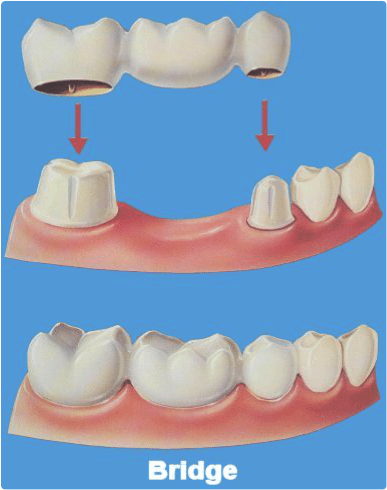What is a Dental Bridge?
Dental Bridges are a dental procedure used to bridge the gap between teeth using dental crowns and a fake tooth referred to as a pontic.
Dental Bridges can be designed to replace a single tooth or a set of teeth, depending on the circumstances. Dental bridges can be made with a variety of materials including ceramic, porcelain, and gold. Dental Bridges are a great option for improving your smile and the overall function of your mouth, but it is important to fully understand the pros and cons of this procedure before deciding on the best treatment option for your particular dental need.
Pros of Dental Bridges
A significant upside to Dental bridges is their versatility. Dental bridges can replace a single missing tooth or set of teeth. There are also multiple types of dental bridges such as traditional, cantilever, or maryland, all of which have a specific use and application. Dental bridges also come in a variety of materials, allowing patients more freedom to choose an option that matches their budget and goals.

During the actual procedure the dental bridge is custom fit to match a patient’s entire mouth and smile, which reduces overall discomfort. In only a matter of weeks there is not much distinction between the dental bridge and the rest of the mouth. Another pro of dental bridges is that they can be maintained through regular brushing, just like real teeth. Overall, dental bridges are a great option to restore the normal function of your mouth and improve your overall smile.
Ready to schedule your first appointment for a dental bridge?
Cons of Dental Bridges
Although dental bridges are a great option to improve your overall dental health there are some potential draw backs that vary depending on personal preferences. One potential con to dental bridges is that they are not a permanent fix. The normal lifespan of dental bridges is 10- 15 years, provided they have received proper care. For some patients that lifespan is not long enough to warrant having the procedure. Also, the process of applying dental crowns to the teeth adjacent to the gap can be seen as undesirable for some patients.
Dental Bridge Pros and Cons Summary
Pros
- Restores normal mouth function
- Improves the overall look of your smile
- Relatively easy maintenance
- Faster procedure than implants
Cons
- Not a permanent fix
- Utilizes crown on the adjacent teeth
- Can make flossing difficult
Dental Bridges vs implants
An alternative to Dental bridges is dental implants. Dental implants provide many of the same benefits of a dental bridge with the added advantage of being able to replace a single tooth without affecting the surrounding teeth. Dental implants can also help prevent bone loss since the implant acts as a substitute tooth root.
While implants can be a great choice to replace a missing tooth or teeth there are aspects of the procedure that require serious consideration. Dental implants require surgery to be inserted into a patient’s jawbone. Also, the dental implant procedure is completed over a course of months, making it a slower procedure compared to dental bridges.
Are you still unsure about your best treatment option? Our professional and friendly dental staff can help you determine the best choice for your dental health and budget.
Call today at (916) 441–5800
to learn more about our dental services.
